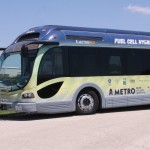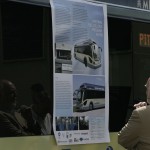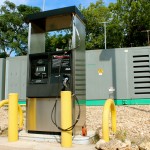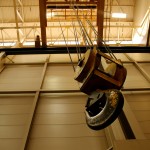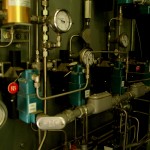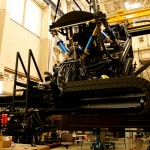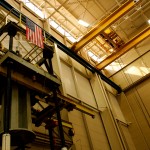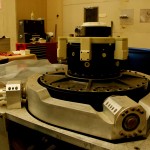Why Some Longhorns Won’t Be Riding Dirty (Buses) Anymore
- Researchers at UT’s Center for Electromechanics unveiled the new hydrogen hybrid bus.
- CEM Director, Robert Hebner studies the bus at the demonstration kick off event.
- StateImpact takes a tour of the hydrogen fuel station at the Center for Electromechanics.
- The hydrogen dispenser station looks a lot like a regular gas station.
- Six high pressure cylinders store hydrogen fuel on site. “At this station we can store approximately 80kg of hydrogen… With the amount of storage we have here we’re able to refill the bus daily to its full capacity,” said Program Director, Michael Lewis.
- The working floor of CEM features numerous prototypes and ongoing demonstrations.
- A series of gauges monitor the purity of the hydrogen gas produced. Only purified hydrogen gas is stored in the six high pressure cylinders.
- State of the art cylinders store hydrogen gas safely, even in Texas heat.
- CEM researchers have developed additions for the Hobby-Eberly Telescope at the McDonald Observatory.
- At any given time, CEM sponsors more than a dozen engineering projects.
- CEM has also developed flywheel energy storage technology.
The wheels on the bus go round and round … but water is the only exhaust.
That’s what researchers at the Center for Electromechanics (CEM) at the University of Texas at Austin have to say about their new Hydrogen Hybrid Bus. The new bus will be featured as part of UT’s shuttle system and will alternate between the Forty Acres and Intramural Fields routes.
“The advantage is, frankly, that it uses less hydrogen. We take advantage of batteries to provide most of the propulsion power. And the fuel cell just recharges the batteries,” said Robert Hebner, director of CEM in an interview with StateImpact Texas.
The new bus, manufactured by Proterra, uses mobile hydrogen fuel cells to recharge a massive lithium-titanate battery pack that keeps the wheels turning. The bus was launched earlier this month as part of a year-long demonstration funded by the National Fuel Cell Bus Program, an initiative headed up by the Federal Transit Administration (FTA) to explore greener mass transit options.
Local and national partners including Capital Metro and the Texas Commission on Environmental Quality (TCEQ) hope that data collected from the bus’s daily operation will better inform fuel cell technology.
According to program manager Michael Lewis, the new bus is equipped with a data acquisition system that will closely monitor the overall fuel economy of the bus. The system measures battery voltages and currents, hydrogen fuel consumption, energy and power flows to the motor from regenerative braking, and even air conditioning loads every second. Collected data may help to determine which features work best in terms of efficiency.
Fuel for the zero-emission bus is provided by a hydrogen fueling station, constructed in 2008, at the J.J. Pickle Research Campus at UT.
The station produces hydrogen fuel using a process called natural gas steam reformation, where hydrogen molecules are stripped from methane gas. The hydrogen gas is then stored in six high pressure cylinders on site which feed into a dispensing station that looks a lot like a normal gas station.
But wait — isn’t carbon dioxide a key by-product of natural gas?
“From a wheel to wheel perspective, hydrogen fuel cell vehicles, even if they are getting their hydrogen from natural gas reformation, are still better than your diesel engine and gasoline engine vehicles that currently run on the road today,” says Lewis. “Since we are making the hydrogen from natural gas, there are some CO2 emissions that are associated with that. However, the station centralizes those CO2 emissions so that, in the future, we can take advantage of sequestered CO2 for use in other renewable processes, such as growing algae for biofuel.” Algae is indeed a hot research topic at the University of Texas at Austin, but the station isn’t sequestering the carbon dioxide yet.
The Texas Electric Vehicle Program from The Daily Texan on Vimeo.
And Austin isn’t the only Texas city experimenting with greener mass transit. San Antonio’s VIA metropolitan transit system features three all-electric buses that recharge throughout the day using a battery fast charge system.
“The engineering question we’re answering today is, does it make more sense to put a fuel cell on a bus or does it make more sense to build the infrastructure for fast charge for battery-powered buses? No one has the answer to that yet,” says Hebner at UT’s Center for Electromechanics. “After we run this bus for a while… we hope to provide better information. We have models; we have theories; but we don’t have data. This program gives us the data.”
Currently, most hydrogen fuel cell vehicle research is conducted in California and New York. So Austin’s hydrogen experiment gives Texas an opportunity to do some of that research and development right at home.
